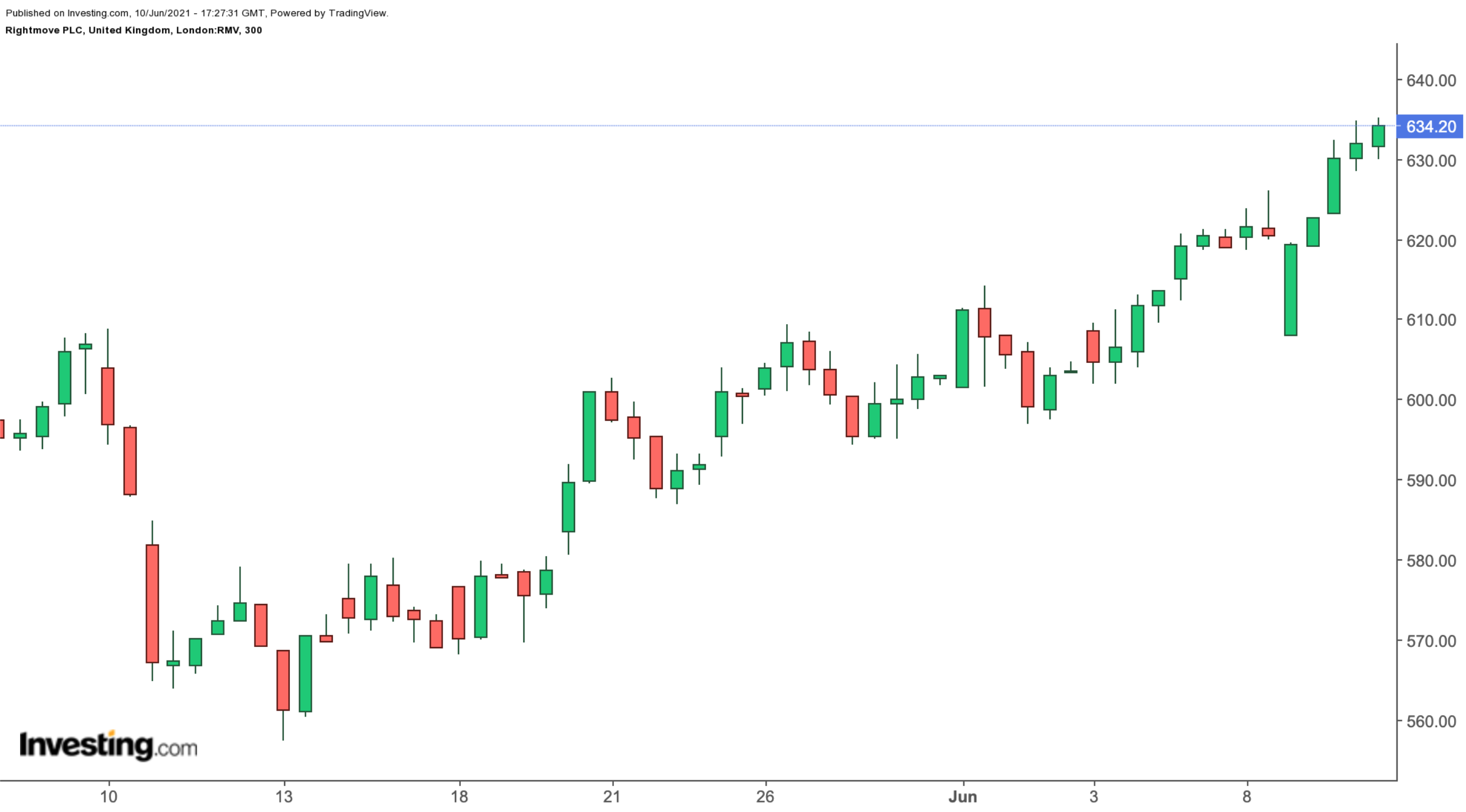Residential real estate has been hot over the past year. For instance, year-to-date, the Dow Jones Real Estate Investment & Services and the Dow Jones Real Estate are up almost 15% and 21.5%, respectively. Similarly, the Dow Jones Global ex-US Select Real Estate Securities Index has returned close to 12% so far this year.
There have been green lights in most fundamental metrics of businesses in the industry. As a result, investors have been paying close attention to the shares of house builders, real estate investment trusts (REITs), as well as online real estate platforms, not only in the US, but across the pond, in the UK, as well.
Therefore, today we discuss the London-based FTSE 100 member and leading property portal Rightmove (LON:RMV) (OTC:RTMVY). In March 2020, the stock price went into free fall. But since then shares have rebounded. Over the past year, RMV stock has returned about 5.9%. But YTD, the shares are down 4.6%.
Rightmove stock closed at 634.2p on June 10 ($17.77 for US-based stock). The 52-week price range has been 523.08p-690p ($13.29 - $18.35 for US-based shares).

The current price supports a dividend yield of 0.72%, and the market capitalization stands at £5.35 billion (or $7.55 billion).
How Recent Earnings Came
Rightmove, UK’s largest digital property marketplace, was founded in 2000, and floated on the London Stock Exchange in 2006. Over the past two decades, management has built a successful business to make rightmove.co.uk number one among UK property portals. Competitors include zoopla.co.uk, primelocation.com and onthemarket.com.
The group currently serves about 20,000 customers, including estate agents, rental agents and new home developers. In other words, Rightmove makes money from charging these customers for using its platform. It operates through three segments, including agency, new homes and others (such as overseas, commercial property and non-property advertising services).
Following the onset of the pandemic, Rightmove initially offered a 75% discount to customers between April and July. Since then, various levels of discounts have continued. Although these discounts have affected revenue levels, they have, nonetheless, helped the group avoid losing customers.
Rightmove released full year 2020 financial results on Mar. 26. Revenue was £205.7 million (or $289.9 million), down 29% year-on-year (YOY). Operating profit of £135.1 million (or $190.4 million) meant a decline of 36.8% YOY. Basic earnings per share also declined 35.7% YOY.
Year-end cash balance was £96.7 million (or $136.3 million), up 166% YOY. Although investors were pleased to see an operating margin of 66%, a year ago that metric was at 74%.
Chair Andrew Fisher, who was pleased with the results, commented:
“Taking the difficult decisions to conserve cash in 2020 has, I believe, helped to preserve liquidity while supporting the investment in the technology and resources required to create long-term shareholder value.”
RMV stocks’s forward P/E and P/S ratios of 30.12 and 26.44 point to a frothy valuation level by historic valuation levels. In other words, there is little margin of safety.
Bottom Line
Rightmove has built a strong brand, delivered impressive profit growth and created shareholder value over the past decade. It has benefited from increasing interest in real estate and homeownership in the UK. Many Britons spend considerable time on the platform when they search for a property to rent or buy.
However, RMV stock is not a bargain investment opportunity right now. The recent price increases have mirrored the strength of the UK housing market. As Rightmove’s businesses is domestic, a potential softness in the local property market could negatively affect its earnings. For instance, an increase in interest rates could destabilize the UK’s housing market. Therefore, a decline toward the 600p level would improve the risk/return profile of a long-term investment in RMV shares.
Over the long-term, however, we are bullish on Rightmove stock. Those investors who would like to invest in Rightmove through an exchange-traded fund (ETF) could also consider researching the iShares MSCI United Kingdom Small-Cap ETF (NYSE:EWUS).
Finally, there are several ETFs that focus on U.S. as well as global real estate investment stocks that could be of interest to some readers. They include:
iShares Global REIT ETF (NYSE:REET) — up 20.3% YTD;
The Real Estate Select Sector SPDR Fund (NYSE:XLRE) — up 23.8% YTD;
Vanguard Real Estate Index Fund ETF Shares (NYSE:VNQ) — up 23.3% YTD;
Xtrackers International Real Estate ETF (NYSE:HAUZ) — up 12.6% YTD.
